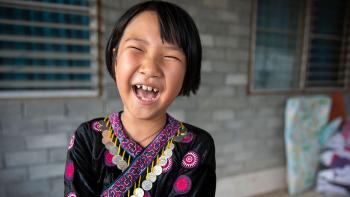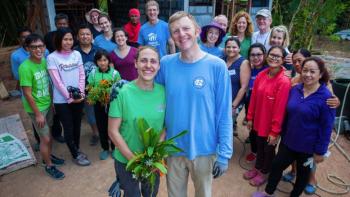Quick Facts
Individuals served in FY22: 190
- Through new construction – 155
- Through rehab – 5
- Through repairs – 30
Volunteers hosted in FY22: 68
Other facts:
- Population: over 71.6 million
- Life expectancy: 79 years
- Unemployment rate: 0.9%
- Population living below poverty line: 6-8%
Source: World Factbook, World Bank
Habitat for Humanity in Thailand
Habitat for Humanity began working in Thailand in the northeastern province of Udon Thani in 1998. Since July 2007, Habitat Thailand has been operating through its national office in Bangkok and zone offices located in Chiangmai (North), Rayong (Northeast), Pathumthnee (Central) and Phangnga (South).
The housing need in Thailand
Thailand has made remarkable progress in reducing poverty from 1990 to 2020. In the last decade, however, the percentage of people living in poverty has remained at around 6-8%, especially in the agricultural sector, based on a government study in mid-2023. Inequality persists with the poverty rate in the south and in the northeast almost double the national poverty rate, according to the World Bank. Thailand’s constitution provides for people’s right to adequate, affordable housing but it is out of reach for many people. The National Housing Authority cited factors such as the lack of decent land for urban housing and continuous rise in construction costs. About 280,500 units have been built under the NHA’s Baan Eua-Arthorn program that began in 2003 for households earning a monthly income of 15,000 baht (US$430) or less.
How Habitat addresses the need in Thailand
Habitat for Humanity Thailand was established in 1998 with the aim of improving the Thais’ quality of life through building homes and transforming communities. It works with like-minded partners to achieve a lasting, positive impact through holistic development and sustainable change. Habitat Thailand has partnered with 11,500 families or over 46,000 people to build, repair and rehabilitate their homes. Based on the needs of families and communities in Thailand, Habitat and its partners also implement community development programs that provide training in livelihood options and assistance in setting up home-based businesses. In addition, health centers, multipurpose community centers, school libraries, vegetable greenhouses, and water and sanitation facilities are also built. Corporate partners include Korean Reinsurance, Destination Asia, Thrivent, Bain & Company, Dow, HMC Polymer, Cargill, Ananda Development & Partners, Siam Commercial Bank, Seagate, Caterpillar, Nissan, Cigna, Bank of America, P&G, Credit Suisse, HMC Polymer, Hilton Pattaya, Benefit Cosmetics and HSBC. Local and International schools and universities also lend a hand.
Secure, affordable homes
Habitat for Humanity Thailand and its partners work with low-income families including female-headed households to build or improve a place they call home. In Thailand, it is estimated there are more than 1.4 million households that are headed by single parents, 80% of whom are women. To date, we have built, repaired and rehabilitated homes with more than 11,600 families in Thailand.
Working with people living with disability
Each year, the Thai government provides for 10 home repairs for people with disability in each subdistrict, with a subsidy of 20,000 baht (about US$570) per family. Habitat Thailand raises funds to match that budget to help these families repair their homes through a partnership with the Provincial PWDs Association.
Projects with upcycled materials
We partner with universities, public organizations, and companies to produce and certify upcycled construction materials for building or repairing homes. Such housing solutions are a draw for donors that are concerned about climate change. Together with P&G and other like-minded partners, we are involved in housing projects that featured upcycled construction materials in the non-living space components of the houses.
Improving school facilities
Habitat Thailand also helps to improve school sanitation facilities as well as school canteens to create a healthy and conducive learning environment for children. This complements our housing programs that build strength, stability and self-reliance through shelter.


